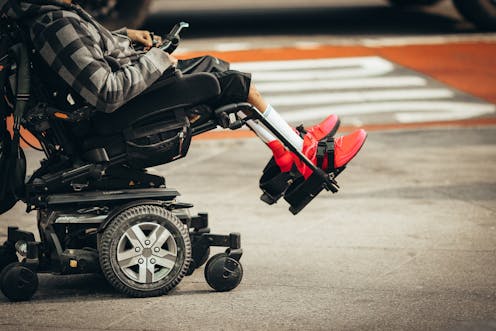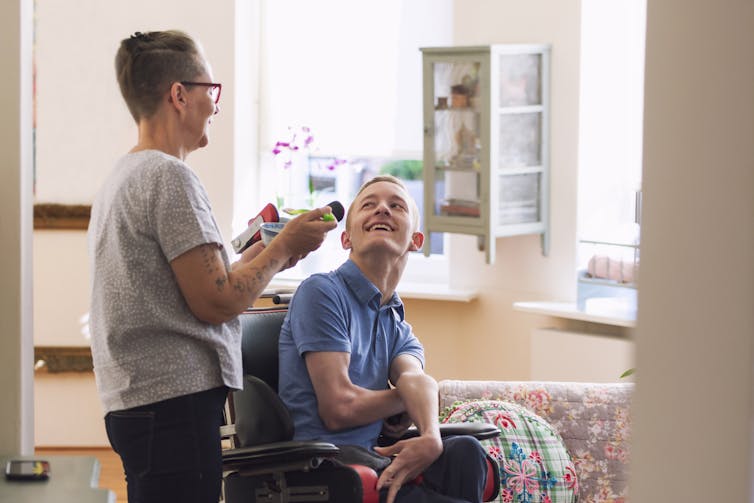
The National Disability Insurance Scheme (NDIS) was designed to be a market-based system that would shift power from government and providers to consumers.
The NDIS Quality and Safeguards Commission’s Own Motion Inquiry report demonstrates that for the most vulnerable NDIS participants, there is still a power imbalance, with providers and workers still in charge.
The Commission found more than 7,000 serious incidents were reported in a sample of seven of the largest disability group home providers over the past four years. Given that many people living in group homes are voiceless and unable to report, this is likely to be a significant underestimate of incidents. This latest report shows 17,000 Australians living in group homes are too frequently subjected to sexual misconduct, coercion, serious injury, abuse and neglect.
Most people living in group homes are “captive” to traditional disability providers. They are locked into arrangements where they have little or no choice about where they live, who they live with or who provides personal and other supports. But we know there are far better options.
The right to choose where you live
In addition to the quality of support being a problem in group homes, the physical environment is often also inadequate. Most group homes are old housing stock that does not meet contemporary standards. Most of this stock is owned by state governments.
The buildings do not foster independence, dignity or privacy. The redevelopment of this stock into contemporary housing that incorporates assistive technology and is designed to maximise independence has the potential to reduce the cost of paid supports and the liability of the scheme.
Australia is a signatory to the United Nations Convention on the Rights of Persons with Disabilities that states people with disabilities should:
[…] have the opportunity to choose their place of residence and where and with whom they live on an equal basis with others and are not obliged to live in a particular living arrangement.
Many people now living in group homes across Australia have the capacity to move to more individualised and inclusive living arrangements. A further 2,500 younger people with disability live in aged care. To explore alternatives and make an informed choice, NDIS participants in group homes and aged care need skilled and patient support from independent experts.

Read more: Everyone is talking about the NDIS – we spoke to participants and asked them how to fix it
More independent options
Under the Coalition government, the National Disability Insurance Agency (NDIA) saw independent living options as a short-term solution to cut costs. Instead, it could improve participant outcomes, increase independence and reduce lifetime care costs.
While many people with disabilities are living good lives in individual supported living arrangements with funding from the NDIS, most require enormous effort and commitment from family members to set up and maintain.
The NDIA needs to fund expert support so a greater range of NDIS participants, including those with limited social support, can set up and maintain high quality independent living options.
Co-located apartments
New disability housing in Australia includes more than 1,300 single occupancy apartments being developed by specialist disability accommodation providers.
These apartments generally have ten apartments co-located in a mainstream development so NDIS participants are not segregated. They have neighbours like everyone else and can live with their partner or children.
There is smart home and communication technology built into each apartment and an additional apartment that is a base for support workers to enable the cost-effective delivery of support. While this model does not suit everyone, early research shows it has the potential to increase the health, wellbeing and independence of people with disability and reduce support costs.
Under the previous government, the NDIA undermined rather than embraced this innovation in disability housing.
Not everyone has family to rely on
The most vulnerable people with disability are those who do not have family or friends in their lives. They are totally dependent on people who are paid to support them.
At worst, all the paid people in their lives may be employed by one organisation, such as in a group home. This increases their vulnerability to mistreatment and might make them less likely to feel they can report abuse or neglect to a trusted or independent person.
For this reason, the proposed increased regulation for group homes is unlikely to improve lives or keep people safe.
Not everyone will be able to move out of group homes into more independent living options. However, there are a range of solutions that will transform disability housing and support in Australia:
growing evidence-based programs that support NDIS participants to maintain and develop social relationships, and increase community participation
information and resources co-designed by people with disability for people with disability about exploring housing options, support and moving house
independent experts to support people in group homes to explore housing and support options, make an informed choice and move out if and when they want to
peer support services that provide the wisdom and expertise of other people with disability who have made a move
decision-making support for people with cognitive and communication impairments
scaling up evidence-based interventions such as participant-led videos that enable NDIS participants to train and direct the disability support workers who work for them
developing new training courses for disability support workers that are evidence based and co-designed by people with disability
developing a range of individualised and contemporary models of housing and support
government to address third line forcing ie, where people living in an group home are required to used one provider for all of their disability supports (sometimes includes support coordination and allied health)
measuring the outcomes and experiences of NDIS participants who move to inform ongoing innovation and foster a truly consumer-driven market.
Read more: NDIS participants are left waiting for too long in hospital beds due to bureaucratic delays
Empowering people with disabilities
An effective market-based system requires empowered consumers who are able to make informed decisions about the services and products they use.
At the start of the scheme, more than A$100 million was invested in supporting providers to make the transition to a market-based system.
The latest findings are shocking and show Australia needs to invest now in the capacity of NDIS participants to be part of an effective and safe disability housing market driven by the people living in it.
The real solutions to the abuse and neglect in group homes involve supporting people with disability to become informed and empowered consumers, exercise choice and control and realise their citizenship.
Correction: this article originally stated more than 7,000 serious incidents were reported in a sample of seven homes. This has been amended to reflect it was the seven largest disability group home providers.
Di is the CEO of the Summer Foundation, a not-for-profit organisation dedicated to the issue of younger people living in Residential Aged Care (RAC). The Summer Foundation developed the Housing Hub which is an online platform to help people with disability explore and find housing. Di is also a director of Summer Housing, a not-for-profit Specialist Disability Accommodation (SDA) provider.
This article was originally published on The Conversation. Read the original article.







